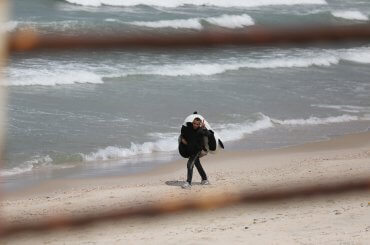Palestinians gather at a livestock market ahead of Eid al-Adha in Deir al-Balah in the center of the Gaza Strip on July 28, 2020. (Photo: Ashraf Amra/APA Images)
The Latest:
- 15,232 Palestinians have tested positive for COVID-19; 11,762 in the West Bank; 75 in Gaza; 3,395 in East Jerusalem
- Of Palestinians who tested positive for COVID-19, at least 7,638 reside in Hebron
- 85 Palestinians have died of COVID-19 related causes
- 70,970 Israelis have tested positive for COVID-19; 512 have died from COVID-19 related causes
Palestinians joined Muslims around the world in celebrating the Eid al-Adha holidays on Friday, the second of two Islamic holidays celebrated each year. Tens of thousands of Palestinians took to the Al-Aqsa mosque in occupied East Jerusalem for Eid prayers in the morning — with each worshiper required to wear a mask and bring their own prayer rug.
Eid al-Adha, or “festival of sacrifice,” honors the willingness of Ibrahim (Abraham) to sacrifice his son Ismail (Ishmail) as an act of obedience to God. The holiday is celebrated with prayers, family gatherings, and most importantly, the sacrifice of an animal (typically goat, lamb, or cow) for those who can afford it.
This year, however, Eid celebrations were noticeably different. Shops and stores in the West Bank were shuttered, following orders by the Palestinian Authority (PA) to enforce a three-day lockdown over the weekend in an effort to limit the spread of the coronavirus over the holiday. Slaughterhouses and butchers, typically crowded in the week leading up to Eid, noticed a decline in customers as many Palestinians this year can’t afford to sacrifice a sheep, which can reach upwards of $500 depending on its size. With many people out of work due to COVID-19, local officials are expecting a 20% decrease in the purchase of sacrificial sheep and goats this year.
According to the World Health Organization, since July 1 the average daily number of new cases of COVID-19 in the Palestinian territory has been 402. Since mid-July, the overall number of cases has doubled, and within this period there have been at least 37 new deaths.
Travel between Palestinian governorates has been banned in an attempt to keep the outbreak in Hebron contained, which seems largely to have been effective although we are still seeing the numbers climb inside of Hebron.
Social gatherings like weddings and funerals are still prohibited, save for outdoor religious prayers for the Eid holiday. Prayers are capped at 15 minutes and which is already proving difficult to enforce.
First new cases in Gaza since June

Palestinian students prepare chocolate for distribution to poor families, ahead of the Eid al-Adha in Gaza City on July 30, 2020. (Photo: Mahmoud Ajjour/APA Images)
This week the Gaza Strip recorded four new COVID-19 cases. They were ther first new cases in Gaza since June 11, and overall the number of active cases in the area remains low. However, testing has remained limited and only at entry ports, checkpoints, and inside of the quarantine center. Until now there has been no system of mass testing for the community.
Given the low number of cases, restrictions are more lax in Gaza than in the West Bank. Individuals living in the same household are allowed to attend mosque together for prayers, although each group is required to socially distance themselves from other families attending the same sermon.
55% of Palestinians say they are newly out of work
Economic losses are hitting most Palestinians hard, and are likely a cause behind a relatively high level of distrust for the government. In the latest public opinion poll conducted by the Palestinian Center for Policy and Social Research, Khalil Shakaki’s project, 61% of Palestinians said their wages or income has completely stopped due to the pandemic. Fifty-five percent told researchers that they are newly unemployed. Keep in mind, Palestinians responded to the poll questions between June 17 to 20.
Konrad-Adenauer-Stiftung in Ramallah participated in conducting the poll.
The latest poll also reveals that skepticism towards the government is commonplace. Only 56% of Palestinians believe their governments are transparent on the number of infections and deaths. Another 65% said they disagreed with the PA’s decision to allow Palestinian workers to enter Israel, which many fault as a primary reason for the rise of the second wave of the virus.
To get the outbreak under control, the Palestinian ministry of health estimates it needs to test 150,000 people per month until the end of 2020. Thus far, the ministry has only been able to distribute just under 200,000 tests since May.
That’s it for now. Stay safe and we’ll see you next week.


